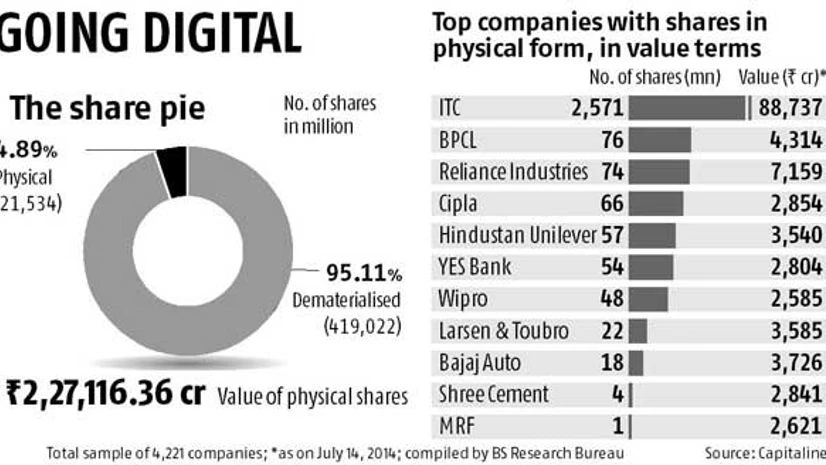The Securities and Exchange Board of India (Sebi) has embarked upon an ambitious plan of doing away with physical share certificates by making dematerialisation compulsory by the end of this financial year.
The move is likely to impact shares worth about Rs 2.3 lakh crore, currently held in paper format.
According to people privy to the matter, Sebi has already set the ball rolling to make necessary amendments in the Depositories Act to eliminate physical shareholding from the securities market. As of June, about 21 billion shares in about 4,000 listed companies, five per cent of the total shares, were in paper format.
Under the current provisions of the Depositories Act, non-promoter investors have an option to hold securities either in physical form or in demat format.
The two depositories, National Securities Depository Ltd (NSDL) and Central Depository Services Ltd (CDSL), said doing away with physical share certificates would bring about more transparency and develop the capital market. “The time has come for investors to no longer have the option of physical shares. If investors want to trade, it is essential for them to have demat accounts, as delivery is not possible without these. Currently, non-active consumers are the only ones holding share certificates,” said Nageswara Rao, managing director and chief executive, NSDL.
T S Reddy, managing director and chief executive of CDSL, said, “It will be good transition for the market. I doubt if any section of the market will be opposed to the idea. In my opinion, the transition will be smooth; the only hurdle will be in the case of companies that no longer function or have no trading activity.”
In 2011, Sebi had issued circulars, announcing 100 per cent dematerialisation of promoter shareholding mandatory. Currently, shares are held in physical format by non-promoter shareholders, including retail and corporate ones.
To encourage these investors to convert physical shares into demat form, Sebi plans to initially approach large investors such as the government, companies and institutional investors. Companies with substantial shares in physical format include ITC (shares worth Rs 88,737 crore in physical form), Reliance Industries (Rs 7,159 crore) and Bharat Petroleum Corporation (Rs 4,313 crore).
Subsequently, Sebi might mandate all new shares issued through a rights issue or a follow-on public offering to be in demat form. Shares issued to investors through initial public offerings have to be in demat form.
Sebi is in talks with market participants to finalise the modalities of the transition to the demat mechanism. Experts said the regulator might have to come out with a resolution for physical shares that aren’t converted into demat. The concept of demat, or an electronic record of share certificates, was introduced in 1996. Currently, all trades are settled in demat format; however, certain section of the market continue to hold physical certificates. “Earlier (in 1996), the challenge was to convince investors holding shares in electronic form was a good idea. Now, this is no longer the issue. Investors have matured and have adapted to the demat mode adequately,” said Rao.

)
